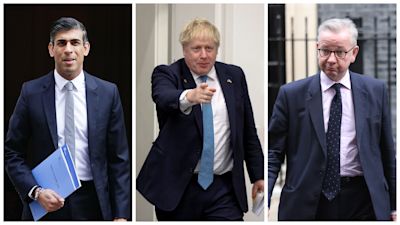Insight
Cabinet tensions heighten over whether the government is truly Conservative

Talk of a pre-summer reshuffle is causing nerves and some anger across the Cabinet. There are some in the Treasury who genuinely believe that Boris Johnson will use it to sack Rishi Sunak, as relations between Number 10 and Number 11 continue to deteriorate. Among some of the PM’s allies is a frustration that the chancellor isn’t willing to intervene at the level necessary to ease the pain of the cost-of-living-crisis.
But, on the flip side, some in the Treasury see Johnson as the biggest block to the chancellor’s desire to cut taxes.
To be clear – that is not because the PM does not want to be a tax-cutting Conservative – he absolutely does. The point of difference is over how you fund those cuts - and whether it involves borrowing or not. For Sunak, it does not. He believes that the ultimate route to reducing people’s taxes is through public spending restraint. That is why he almost resigned over the demand for a massive spending boost to deal with NHS backlogs, and eventually social care. Some in the Cabinet – including Foreign Secretary Liz Truss – believed that the spending should be funded through borrowing. Instead, Sunak insisted on the national insurance hike to act as a levy to fund the new policy – hoping that would imprint in the minds of the public and Tory MPs that every extra penny of spending would mean extra tax. He hoped that eventually it would help make the argument for the opposite move – to cut both spending and taxes. There are several Cabinet ministers who believed the NI rise was wrong. One Cabinet source claimed it was done for “the worst possible reason - for the Treasury to show its authority”. And they are even more angry that it wasn’t reversed. But that doesn’t mean they disagree with Sunak fundamentally. I’ve spoken to a number of senior figures in government who share his belief that to cut taxes you need to cut spending – and are ready to see that happen. Some tell me that it isn't right to frame the current situation as Sunak v the PM but more as traditional Tories across the Cabinet frustrated about the direction of travel. They are frustrated by what they see as an interventionist streak from Johnson and others. One said they were worried that he would give in to expensive demands around public sector pay, for example, making it harder to cut taxes in future. “He just wants to be liked".
Others raised the name Michael Gove instead – arguing that it was him rather than the PM who was most taken by the idea of intervening more heavily. They said he had taken that position over Covid, over planning laws and metro mayors. Then there is the question of refugees and Ukraine. Gove’s idea of seizing the mansions of sanctioned oligarchs and using them to house Ukrainians fleeing the war was met by disbelief among some MPs on the right of the party - and a good few of the more traditional Cabinet ministers. They see protecting property rights as absolutely fundamental for the Tory party – and fear this policy will cut across that.
The issue has been discussed at the top of government, and while Gove is determined to push ahead, senior Cabinet ministers have warned him that it is unworkable, and the chief whip has suggested a number of MPs will oppose the move. One MP – Steve Baker – told me it was “neo-Conservative nonsense” – again highlighting that growing divide within the party.
Add into the mix the suggestion that he could be moved to the Home Office and the tensions are even more intense. And to some extent in both directions. Officials in Gove’s levelling up department tell me that while in the bigger Homes for Ukrainians scheme they get that the Home Office has to vet people coming from Ukraine and families offering them homes, they are frustrated with the pace, claiming the bureaucracy of the form-filling is over the top and slowing things down. Overall this adds up to a party that has changed in recent years for a number of reasons –including a new electorate that brings in many working class voters who historically backed Labour and the unprecedented demands of the Covid pandemic. That made it become a party that was far more ready to intervene in people’s lives than Tories ever had before. Now Sunak wants to transition back to a much more free-market vision - in a recent lecture the hero he picked out was the father of capitalism, Adam Smith. But as inflation continues to soar, his journey there is an incredibly painful one, in which calls for more government support are unlikely to subside anytime soon. Perhaps that is why, in a spring statement that was designed to take a middle track on this – he failed to please either side.